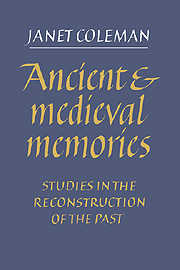Book contents
- Frontmatter
- Contents
- Preface
- List of abbreviations
- PART I THE CRITICAL TEXTS OF ANTIQUITY
- Introduction
- 1 Plato
- 2 Aristotle
- 3 Cicero
- 4 Pliny and Roman naturalists on memory; Borges's Funes the Memorious
- 5 Plotinus and the early neo-Platonists on memory and mind
- 6 Augustine: the early works
- 7 Augustine's De Trinitate; on memory, time and the presentness of the past
- PART II THE PRACTICE OF MEMORY DURING THE PERIOD OF TRANSITION FROM CLASSICAL ANTIQUITY TO THE CHRISTIAN MONASTIC CENTURIES
- Introduction
- PART III THE BEGINNINGS OF THE SCHOLASTIC UNDERSTANDING OF MEMORY
- Introduction
- PART IV ARISTOTLE NEO-PLATONISED: THE REVIVAL OF ARISTOTLE AND THE DEVELOPMENT OF SCHOLASTIC THEORIES OF MEMORY
- Introduction
- PART V LATER MEDIEVAL THEORIES OF MEMORY: THE VIA ANTIQUA AND THE VIA MODERNA.
- Introduction
- Conclusion: an all too brief account of modern theories of mind and remembering
- Bibliography
- Index
2 - Aristotle
Aristotle on memory. The two-fold analysis of the soul; the relation between the lower, physical and the higher, intellectual ‘parts’. ‘De Anima’ and ‘De Memoria et Reminiscentia’; representative language and the distinction between history and rhetoric.
Published online by Cambridge University Press: 06 January 2010
- Frontmatter
- Contents
- Preface
- List of abbreviations
- PART I THE CRITICAL TEXTS OF ANTIQUITY
- Introduction
- 1 Plato
- 2 Aristotle
- 3 Cicero
- 4 Pliny and Roman naturalists on memory; Borges's Funes the Memorious
- 5 Plotinus and the early neo-Platonists on memory and mind
- 6 Augustine: the early works
- 7 Augustine's De Trinitate; on memory, time and the presentness of the past
- PART II THE PRACTICE OF MEMORY DURING THE PERIOD OF TRANSITION FROM CLASSICAL ANTIQUITY TO THE CHRISTIAN MONASTIC CENTURIES
- Introduction
- PART III THE BEGINNINGS OF THE SCHOLASTIC UNDERSTANDING OF MEMORY
- Introduction
- PART IV ARISTOTLE NEO-PLATONISED: THE REVIVAL OF ARISTOTLE AND THE DEVELOPMENT OF SCHOLASTIC THEORIES OF MEMORY
- Introduction
- PART V LATER MEDIEVAL THEORIES OF MEMORY: THE VIA ANTIQUA AND THE VIA MODERNA.
- Introduction
- Conclusion: an all too brief account of modern theories of mind and remembering
- Bibliography
- Index
Summary
Memory, its physical structure, is an unsolved challenge. It is, perhaps, the central question… But theories about the nature of memory have still not really progressed beyond the stage of description through analogy. Analogy has often been a valuable step in the discussion of biological problems, but it is, of its nature, constrained by the technological development of the time or the level of scientific knowledge in other fields… Even current models of memory dwell on analogies with existing, artificial methods of storing information. Mental memory has been compared with the electro-magnetic polarisation of ferrite rings in the core memory of a computer, and with the ‘distributed’ image of a hologram – a device that stores a record of a three-dimensional scene by photographing the interference pattern produced by illuminating it with laser light… In any case, most theories of memory, whether couched in terms of mere analogy, or even in terms of the storage of information in networks of real nerve cells, concentrate on the manner in which events can cause changes in physical structures. In other words, they are concerned with the machinery of memory, not the code – the symbolic form in which the events are registered… Most theories of memory are, as it were, concerned with the question of ink and paper and not with the much more fundamental issue of the grammar of remembrance.
Colin Blakemore, Mechanics of the Mind (Cambridge, 1977), pp. 101–6.- Type
- Chapter
- Information
- Ancient and Medieval MemoriesStudies in the Reconstruction of the Past, pp. 15 - 38Publisher: Cambridge University PressPrint publication year: 1992

